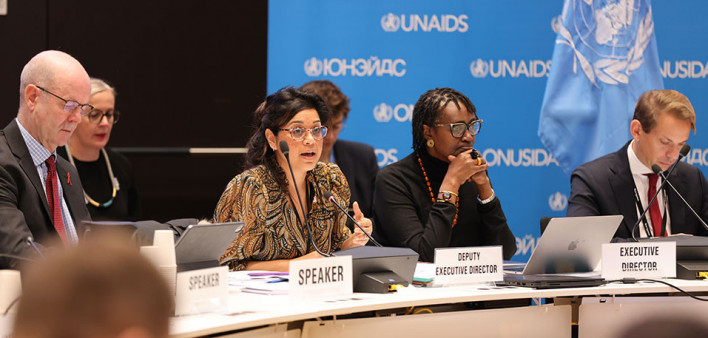The 53rd meeting of UNAIDS’ Programme Coordinating Board (PCB) concluded [December 14] in Geneva, Switzerland, with Board members making strong commitments to redouble efforts to end AIDS by 2030.
In her remarks to the Board, the executive director of UNAIDS Winnie Byanyima said, “I wish I could tell you now was the time to relax, but we are not done yet. And pulling back before we are done—that is how pandemics resurge; how the least powerful get left behind; how the virus thrives. In a pandemic, there is no standing still. If we do not make progress, the virus will.”
This PCB meeting took place at a critical time for the response to HIV, midway through the Global AIDS Strategy 2021-2026 as UNAIDS is redoubling its focus on achieving the 2025 targets.
The First Lady of Namibia, Monica Geingos, delivered the keynote address saying, “Partial success in the AIDS response coupled with emerging pandemics has given rise to complacency that must be reversed. Fresh thinking and approaches are urgently required to reach the 2025 targets and to achieve the goal of ending the pandemic by 2030.”
Addressing the shortfalls in global funding for HIV and for UNAIDS, Ms Byanyima urged donors to front-load resources, support developing countries to grow their fiscal space, and to fully fund UNAIDS with multi-year funding (UNAIDS currently has a shortfall of US$50 million). In 2022, US$20.8 billion was available for the global response to HIV, far short of the US$ 29.3 billion needed by 2025.
“We remain deeply concerned about the current funding situation of the Joint Programme and the expected impact on different strategic result areas. We are encouraging all PCB member states and observers to seek ways to augment their support to the Joint Programme in 2024,” said Binod Mahanty, Health Adviser, Federal Ministry of Health of Germany.
Several donors have recently increased their core contributions to UNAIDS, including Côte d’Ivoire, the Netherlands and the United States. During the meeting France announced a 50% increase in its voluntary contribution to UNAIDS, Germany announced an additional 1 million Euros, and Luxembourg announced an additional 100 000 Euros for UNAIDS.
Other countries have also stepped-up support recently, including Australia which announced an investment of up to AU$12 million for a new partnership with UNAIDS to let communities lead in ending AIDS in the Asia Pacific region. Let Communities Lead was the theme of this year’s World AIDS Day report from UNAIDS, which emphasized the critical role communities play in responding to HIV, and how underfunding and harmful barriers are holding back their lifesaving work and obstructing the end of AIDS.
“UNAIDS is a strong voice promoting human rights and fighting inequality, through the evidence-based work addressing the social determinants of HIV, including stigma and discrimination based on gender and sexual identity,” said, Ms Jannicke Graartrud Deputy Permanent Representative of Norway.
“UNAIDS has been providing Cambodia with important support through resource mobilization, a sustainability roadmap and strategic plan, strategic information and data collection and analysis, scale up of innovative prevention and treatment tools as well as on community engagement and strengthening community-led activities,” said Mouly Ieng, Senior Minister, Chair of the National AIDS Authority of Cambodia, Phnom Penh. “Countries are making significant efforts, please do not leave us behind.”
A thematic segment on HIV testing was held on the last day of the PCB. Board members discussed how HIV testing services are the gateway to HIV prevention, treatment, care and other support services. The keynote speaker for the HIV testing segment was Professor Kevin Fenton CBE, Public Health England. He said, “In our efforts to end HIV transmission by 2030, we must let communities lead in redoubling our efforts to deliver what we know works – HIV prevention, testing, PrEP and HIV treatment – at scale. And we must work to end HIV stigma, which prevents so many from living their authentic life, full of compassion, free of fear and able to contribute fully to society.”
“Ending AIDS is possible but only if we take bold action to revolutionize HIV prevention, scale-up testing, fight stigma, discrimination and inequalities, reach young women and girls and key populations with HIV services, remove harmful laws, increase resources and strengthen the multisectoral approach,” said Ms Byanyima.
The UNAIDS PCB is the premier UN and global forum on HIV, bringing together civil society, co-sponsors and member states to help chart the co-creation of the future of the response to HIV, including the development of the next Global AIDS Strategy, the vision for 2030 and beyond.
The 53rd meeting of the PCB was chaired by Germany, with Kenya serving as the Vice-Chair and Brazil as Rapporteur.
The 54th meeting to be held in June 2024, will be chaired by Kenya, with Brazil serving as Vice-Chair and the Netherlands as Rapporteur.
Read the Report to the Board by the UNAIDS Executive Director.
This news release was published by UNAIDS on December 14, 2023.







Comments
Comments